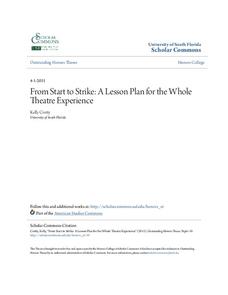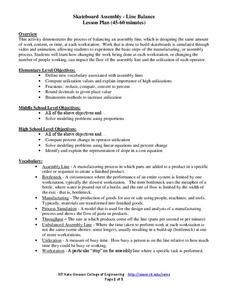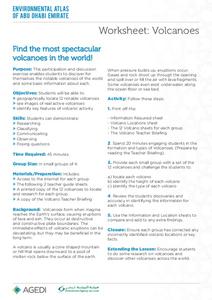Honors College at Scholar Commons
From Start to Strike: A Lesson Plan for the Whole Theatre Experience
Introduce young thespians to all aspects of the theater. A syllabus for a one-semester drama course provides lessons that take learners from the history of drama to the many facets of play production.
Facing History and Ourselves
Kristallnacht: Decision-Making in Times of Injustice
Have you ever been singled out in a crowd before? Pupils investigate and analyze the events of the Holocaust. They dive into the life of a middle school student, as well as the diary entries of those in Kristallnacht during World War II.
Rochester Institute of Technology
Skateboard Assembly - Line Balance
Utilize the instructional activity on utilization. The second installment of a nine-part technology/engineering series teaches scholars about the flow of a balanced assembly line and the definition of utilization. Videos, activities, and...
North Carolina Museum of Natural Sciences
Weather Watch Activity Guide: Groundhog Day
Exactly what do groundhogs know about weather? Not as much as your science students will after completing these lessons and activities that cover everything from the earth's rotation and the creation of shadows, to cloud...
Baylor College
The Variety and Roles of Microbes
Mini microbiologists play a card game in which they group microorganisms by groups: virus, fungus, protist, or bacteria. Then they identify the roles different microbes play in the natural world and explore how humans effectively use...
Rensselaer Polytechnic Institute
Molecules to the Max!—Teacher's Discovery Guide
Molecules to the Max! refers to a movie released in 2009 about the world of atoms and molecules. A helpful discovery guide provides five posters on science topics typically covered at the middle school level. It also explains the...
Beyond Benign
Drafting Bubbles
Let's start designing a house. Future architects create floor plans for a house given certain constraints. They calculate the area of each room in the house. This is the 11th lesson in a 15-part unit.
National Research Center for Career and Technical Education
Hospitality and Tourism 2: Costing
The lesson plan provides a richly detailed narrative and sample problems for teaching or reinforcing how to work with percentages. In particular, your audience will compute the costs per serving of food and simulate setting menu prices...
PBS
Breaking it Down
After challenging themselves to correctly choose the form of erosion and length of time required for a given landform to develop, earth science class members model mechanical and chemical weathering with various lab demonstrations over...
Center for History and New Media
Growing Up in a Segregated Society, 1880s–1930s
What did segregation look like in the beginning of the 20th century? Middle and high schoolers view images of segregated areas, read passages by Booker T. Washington and W.E.B. DuBois, and come to conclusions about how the influence of...
Aquarium of the Pacific
Lego Molecules
Young scientists construct an understanding of molecular compounds in this hands-on science lesson plan. Using LEGO® to model the atoms of different elements, students build molecules based on the chemical formulas of common compounds.
PBS
Blow the Roof Off!
Blow the minds of young scientists with this collection of inquiry-based investigations. Based on a series of eight videos, these "hands-on, minds-on" science lessons engage young learners in exploring a wide range of topics from making...
Curated OER
Flicking Football Fun
Young mathematicians fold and flick their way to a deeper understanding of statistics with a fun, hands-on math unit. Over the course of four lessons, students use paper footballs to generate data as they learn how to create line...
Virginia Department of Education
Modeling Division of Fractions
Provide a meaningful context for learning about the division of fractions with this upper-elementary math lesson. Presented with a simple, real-world problem, young mathematicians work in small groups to develop visual models that help...
NOAA
Mapping the Deep-Ocean Floor
How do you create a map of the ocean floor without getting wet? Middle school oceanographers discover the process of bathymetric mapping in the third installment in a five-part series of lessons designed for seventh and eighth graders....
Beyond Benign
Who’s Your Daddy? Finding the Father
Time for the reveal! The nineth instructional activity of the series of 18 has scholars compare DNA fingerprints of cats to their samples to identify the father of Sparky's kittens from previous lessons. They analyze the DNA bands to...
West Corporation
Making Inferences – Use Your Mind to Read!
How can you tell if someone is happy? The lesson works with elementary and middle school scholars to activate their schema and pay attention to details to make inferences in their daily lives, poetry, and other literature. Cleverly...
Oregon State
World Map of Plate Boundaries
Young geologists piece together the puzzle of plate tectonics in an earth science lesson. Given a physical map of the world, they search for land formations that indicate the location of different types of plate boundaries.
Virginia Department of Education
Integers: Addition and Subtraction
Young mathematicians construct their own understanding of integers with an inquiry-based math lesson. Using colored chips to represent positive and negative numbers, children model a series of addition and subtraction problems as they...
Brooklyn Children’s Museum
Volcanoes!
Give young geologists an up close and personal look at volcanoes with a series of hands-on earth science lessons. Whether they are investigating the properties of igneous rocks, building their own volcanoes, or making fudge to model the...
Beyond Benign
Is It Easy Being Green Game Show
Is it possible to create an environmentally friendly shampoo? Learners accept this challenge in the fifth lesson in a green chemistry series of 24. The analysis of their shampoo ingredients must address pH, exothermic reactions, and...
Beyond Benign
Crossing Hairs
Can you breed the perfect cat? Scholars study how to control genetic traits through breeding. The 15th lesson in a 18-part genetics unit considers the process of cross-breeding to develop a cat with a specific set of predetermined traits.
Oklahoma State University
Hairy Heredity
Young scholars learn that heredity comes down to the flip of a coin with this cross-curricular math and science lesson. Using smiley faces as a model, students toss coins to determine which dominant or recessive traits will be passed on...
Environment Agency - Abu Dhabi
Find the Most Spectacular Volcanoes in the World!
Heat things up in your earth science class with this collaborative lesson on volcanoes. After first being introduced to the different types of volcanoes and how they are formed, young geologists work in small groups to research the...
Other popular searches
- Middle School Lessons Health
- Art Lessons Middle School
- Nouns Lessons Middle School
- Thematic Lessons Middle School

























